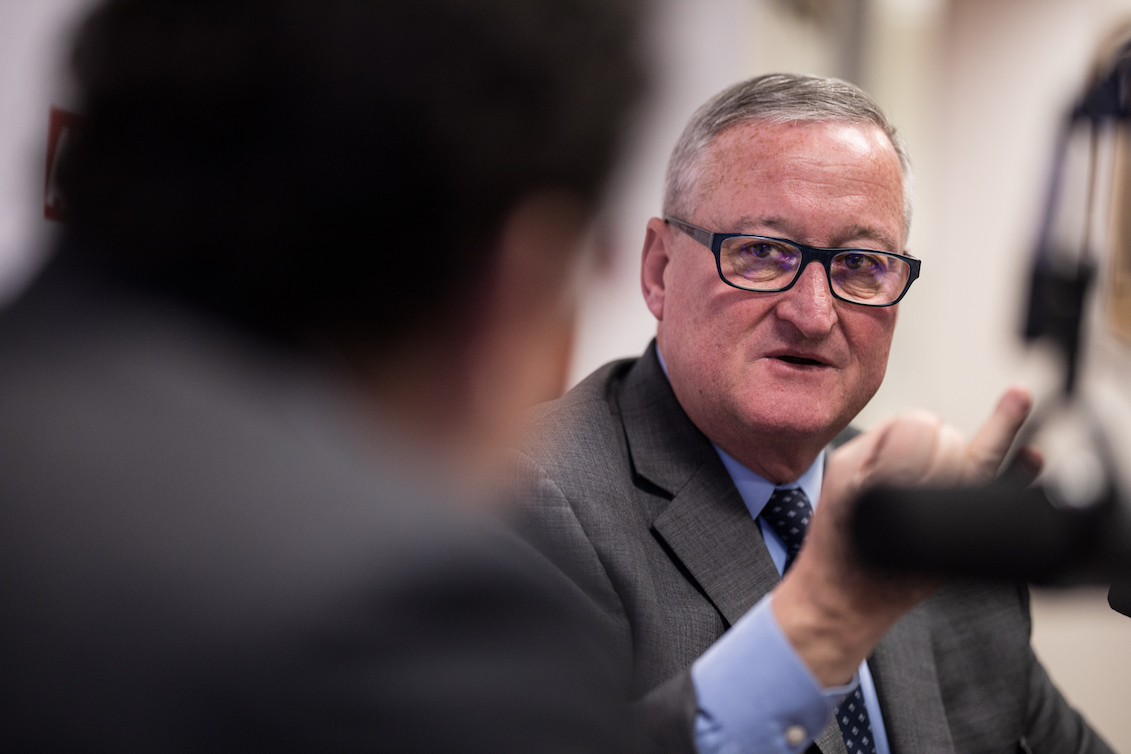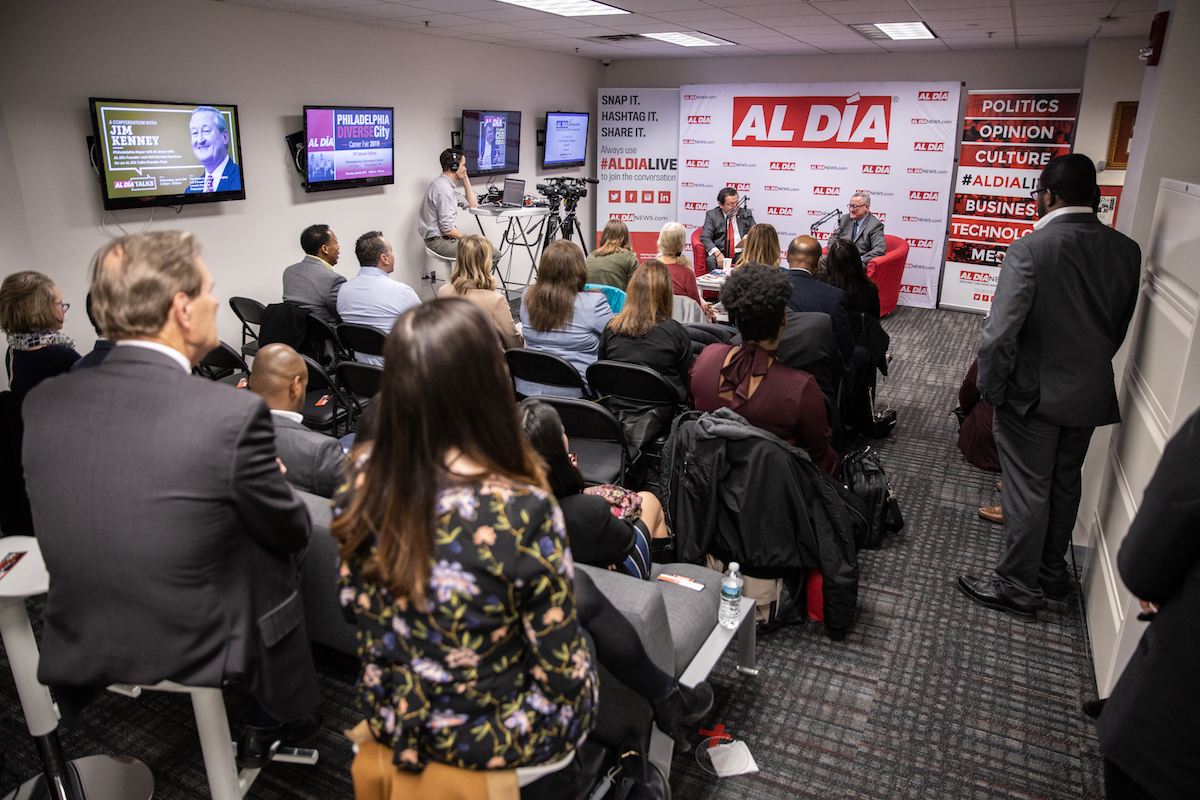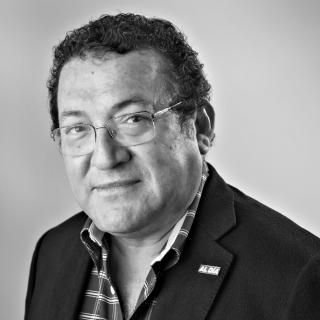
Philadelphia Mayor Jim Kenney visits AL DÍA Newsroom
In an exclusive interview with AL DÍA News, Philadelphia Mayor Jim Kenney opens up about his blue-collar upbringing in South Philly, his passionate support for…
It was officially "sold out".
AL DÍA has been opening its doors to allow an audience to witness our press interviews with public figures in our multimedia newsroom, this one had all the seats taken days in advance.
Mayor Kenney showed up with his entourage at 6 p.m. and thereafter the crowd stopped networking, went silent in an instant, sat quietly in the small auditorium and an uninterrupted one-on-one conversation of over one hour with the mayor quickly got underway.
How was your day? was our first question for the mayor, before the cameras started rolling.
This was probably not going to be his last stop in a long day of campaigning, running city public affairs, staying on top of that ticking clock every hour of the day, all while preparing to pull out his sleeve all of the possible politically correct answers to the deliberate questions from pundits seeking to draw blood for the latest frenzy of political altercation— not uncommon for a town now divided by an unexpected 3-way race for the mayor of Philadelphia. Kenney is now challenged by two Democratic rivals. It’s the first contested primary re-election campaign for mayor of the city over 32 years, and, with the exception of pundits and the campaign staffers, few people fully realize the crucial primary election is coming around fast on May 21.
Mayor Kenney, now relaxed and ready to talk, seemed to appreciate the easy start of the conversation at AL DÍA.
From then on what followed was a dialogue that went overtime, more than one hour and 15 minutes of non-stop conversation during which Kenney’s voice cracked for an instant, when remembering the recent sudden death of his father; then erupted in laughter when asked about his political career being launched by a degree in political science from La Salle; or became solemn when he answered a question on why Philadelphia lapses into judicial prosecution of its political figures for corruption every now and then.
The extended conversation with Kenney revealed an unexpected face of the Irish-American mayor of Philadelphia that in the opinion of several people in the audience precluded from asking questions by previous arrangement with the Mayor’s Office, had never seen, and surprisingly reacted to afterwards, once the mayor finally left and the networking and small talk resumed among the audience that didn’t move during the hour-plus conversation.
A more personal face, definitely more spontaneous than they frequently see, different from his many public appearances throughout the city.
In this exclusive interview with AL DÍA News, the 99th mayor of Philadelphia opened up about his blue-collar upbringing in South Philly, followed with his passionate support for the city’s burgeoning immigrant population, and dwelled on the transforming local political landscape of the city, and the possibilities of eventually electing a Latino mayor.
Hernán Guaracao: You grew up in the Whitman neighborhood of South Philly, that part of the city is now populated by many Latinos. How do you compare today’s South Philly to the South Philly that you lived in?
Jim Kenney: Mexican and other Latinx communities of South Philly are no different than the Irish and the Italians. Remember, the first refugees in America were the pilgrims. They were fleeing religious persecution and they came to North America as refugees. They didn’t discover the place, people were living there—they were called Native Americans, and the Native Americans who met the pilgrims actually showed pity on them and taught them how to farm, how to make clothing, and how to survive the winter, and that’s what we should be doing here with our refugees and our immigrants now [...]
Documented or undocumented, it doesn’t change the human status of the individual [...]A piece of paper does not make you a human being. And so I go back to my Irish roots [...]
When the Irish came to America, they were forced out of their country due to starvation. A million Irish people starved and a million Irish people immigrated, more or less. It was not a famine, it was a hunger. They were tenant farmers, working under the thumb of the British, and food was being shipped out of that country - tons and tons of ships were taking food to Europe and other places for profit. The only subsistence crop the Irish had were the potato and it really, honestly wasn’t even the potato, it was the tuber that the potato was attached to [...]
The worst year was 1847, it was Black ‘47 where the crops in the fields just turned black and it was like oil, they couldn’t even eat them. So they got on ships [...] called coffin ships, and sailed to North America. In the passage people died, they were stuffed in the holes of the ships. And when they finally arrived, those who had survived crawled off the ships and went to Boston and New York and Philadelphia, Baltimore, and other cities along the east coast.

We were told that we were not welcome. That we should get out. That we were dirty. That we were poor. That we didn’t speak English [...] because we didn’t speak English, we spoke [Gaelic]. We were told that we couldn’t live in certain places, that we couldn’t apply for work. That the Irish were a plot by the Pope to take over America, similar to what people are saying about Muslims today. And we didn’t leave, we stayed.
My point is that if you are a hyphenated American and you’re not a Native American and you’re not an African-American, because there are two different stories there, and you look down on or belittle or want to lock up the children of refugees, you are basically not honoring your own heritage in this country. And that’s why I get angry when people say stupid things or cruel things about immigrants.
RELATED CONTENT
When I look at the Latinx immigrants in South Philly, what I see are nuclear families; mom, dad, and kids that work, they start a business or work for someone else [...] These are the people that you want to attract, because at some point in time they are going to do exactly what the Irish and the Italians and the Jewish people did who lived in South Philly, they’re going to make a way for themselves. They are making a way for themselves. If you look at the Italian Market, the composition of the Italian Market, it’s an International Market now and the southern end of Ninth Street is basically Mexican, for the most part. I’m happy with that!
HG: One thing I read that impressed me was that you were the first in your family to attend college, you were the oldest of four, your dad and mom worked two jobs in order to send you to Catholic schools, and you actually studied political science at La Salle University. You are the only political leader that I know that went to school to do the science before you did the practice. Does it make you more competent?
JK: (Laughs) I don’t think so. What makes you competent is experience and people around you that teach you and allow you to grow. The other thing about my parents [...] and I will tell you my dad just passed away in December [...] If you have your parents, please embrace them and don’t let them pass away while you are mad at each other. Because that was not the case with my dad. But you realize how physically and mentally impactful that loss is [...] And when my dad was getting older and sicker, I knew that it was eventually coming [...] but he died of a heart attack quickly. He died right outside of his union hall where he was having lunch with his retired firefighter buddies and those were the last people that he was with, I think he would have been happy that way.
But my neighborhood in the 60s wasn’t exactly the most open-minded neighborhood at the time. There was a lot of stuff going on. The “N-word” was not an uncommon word. You heard it everyday, more than once a day. And there was a lot of strife going on. 1968 was one of the worst years that I can remember, other than the last two. People were unsure about the future of the country and people were unsure about race relations, about civil rights. Nixon was running for president against George Wallace and Hubert Humphrey - we had a white supremacist running for [...] well he was running for president, he didn’t become president like the one that we have [...] there was lots of tension, the Vietnam War was in its heyday, Dr. King and Bobby Kennedy were assassinated, it was an absolute mess.

But in the house that we were raised in, it was a small little row house on a small, little street, no trees, just concrete and blacktop, it was six of us in a small three-bedroom house with one bathroom, but in that house you were not permitted to express those ugly epithets. You were not allowed. No one. God forbid we did it, I’d have a bar of Dove in my mouth. People who visited my house were told, once they dropped that word or any of those words, “You got one, you’re not getting another one. The next one, you’re out the door!” And it became a family joke, “Oh, you can’t say this in Barbara’s house…” No, you can’t. And I think that’s what kept me and my siblings away from the reinforcement of the prejudice.
Kids are not born prejudiced, kids are born perfect. Adults ruin them. I think it was Oscar Wilde that said that everyone is born perfect and then they learn to talk [laughs]. So we had that advantage that we didn’t have to wallow in my parents’ racism or prejudice and that was really wonderful for me [...] and I did the same thing with my kids because I’ve had some relatives that have liked to use words that are not appropriate and got told in my house that, “You’re not doing that in front of my kids, you’re not going to reinforce negative and racist stereotypes in my home.”
HG: Let’s talk about declaring Philadelphia a sanctuary city. What is the cost that Philadelphia has paid for its stance against the federal government and why did you do it anyway?
JK: It’s certainly money that we didn’t want to spend, but not crazy amounts of money. A lot of law firms did pro bono work. It’s a big case for them. Law firms and lawyers like these kinds of prestigious cases and they do it for less than they would normally do it for [...]
HG: I’m just wondering why you put your capital on the very community that cannot vote for you.
JK: Because it’s the right thing to do. We have to call it a Welcoming City because “sanctuary” apparently has become a pejorative word. I don’t understand why, it’s Latin for safe and holy. Who wants a safe and holy city, right? I mean God forbid.
The issue for me is that in order for us to be fair and safe, and safety is a big issue, our immigrant communities, both documented and undocumented, cannot be afraid of the police.











LEAVE A COMMENT:
Join the discussion! Leave a comment.